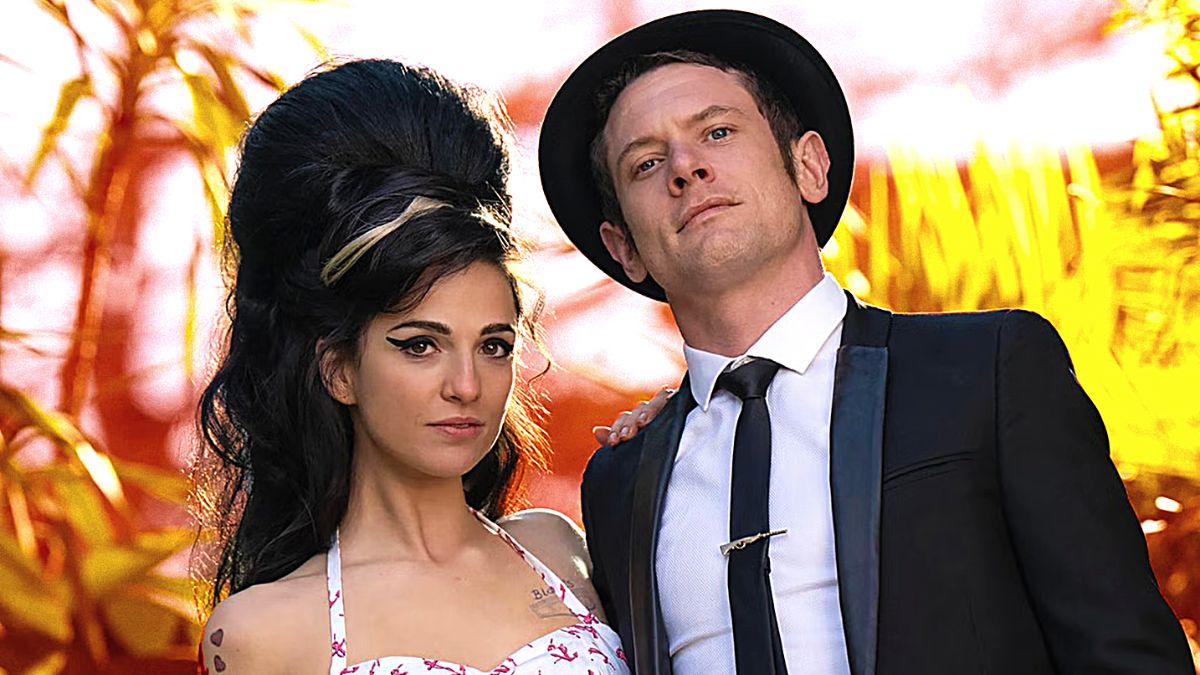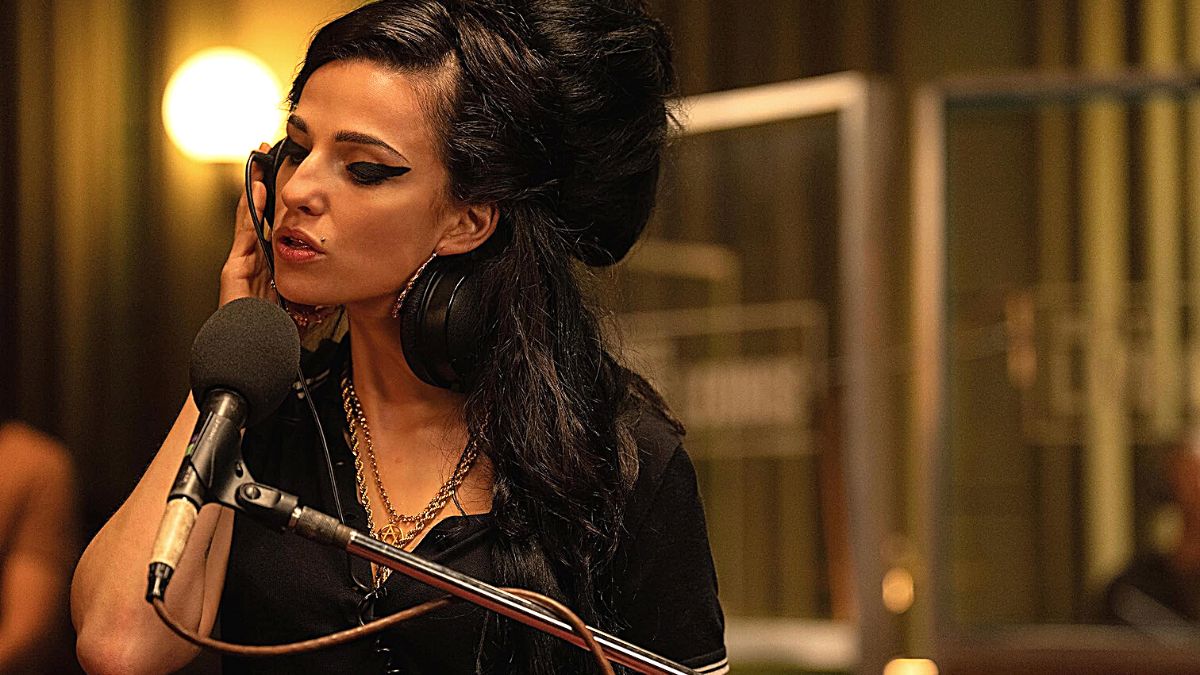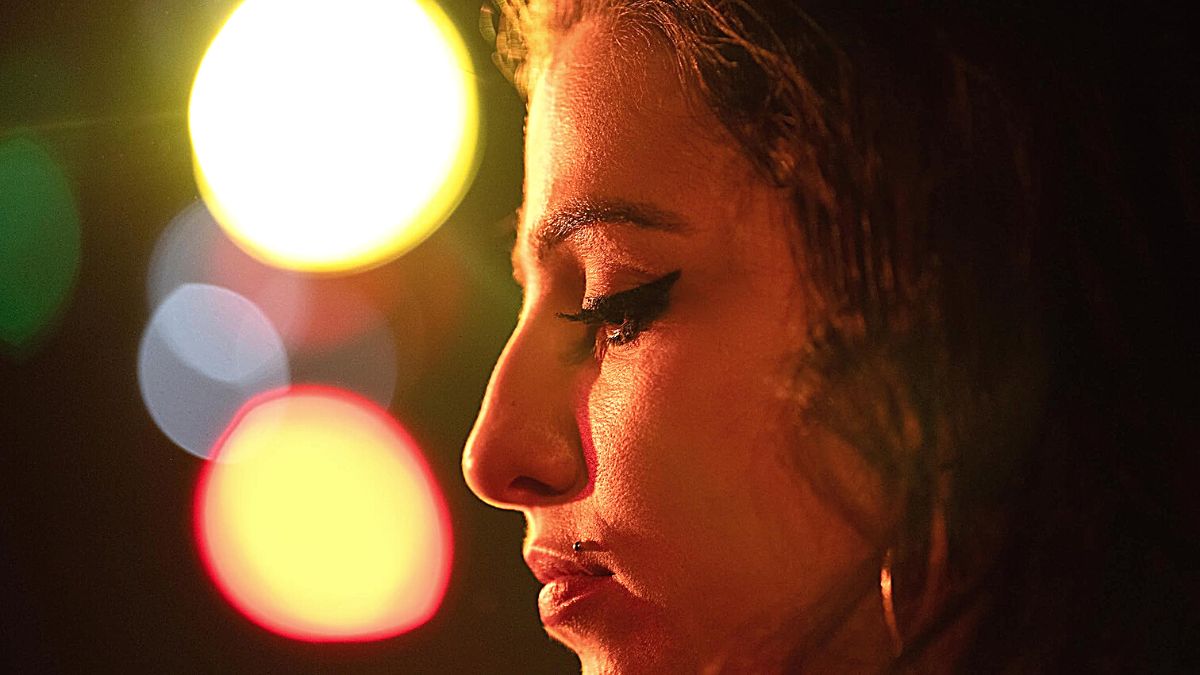Director Sam Taylor-Johnson says that Again to Black shouldn’t be a biopic, however a love story. I’d argue that it’s neither.
Regardless of its sensible, singular moments, Taylor-Johnson’s newest appears not sure of what, precisely, it does need to be. Certain, the love story between Amy Winehouse (performed right here by a spirited Marisa Abela) and Blake Fielder-Civil (Skins‘ Jack O’Connell) is central to the movie, simply because it was to Amy’s life, but it surely’s by no means explored in any significant method.
On the similar time, the chapters of Winehouse’s life singled out for filmic inclusion by Taylor-Johnson and author Matt Greenhalgh appear considerably disorganized and arbitrary. The truth that this isn’t a whole and detailed retelling of Amy’s life isn’t inherently damaging, it’s simply that the standards for what the filmmakers selected to incorporate are foggy at greatest.
What in the end saves Again to Black from its matted self are its real makes an attempt at getting intimate with Amy Winehouse, in the absolute best method. Hers was infamously a lifetime of tumult, extra, darkness, and exploitation, which — moral discussions apart — undeniably offers wealthy materials for a robust, dramatic, and provocative story. The web preemptively assumed that that’s the tack Again to Black was going to take; that it will exploit Amy’s trauma and loss of life to create essentially the most sensationalist movie doable, and appeal to the eye of audiences by means of morbid curiosity. It was a nice shock, then, that morbid exploitation shouldn’t be among the many movie’s points.
There’s a lot sympathy for Amy in Again to Black, which is prolonged, in flip — and a few would argue unjustifiably — to her ex-husband, and to her father, Mitch Winehouse (Eddie Marsan). There aren’t any villains and no victims in Taylor-Johnson’s movie, and there’s a the Aristocracy in that selection. On the opposite aspect of the coin, in its reluctance to evaluate its characters, Again to Black fails to make any substantial assertion in regards to the questionable selections made by each males, in addition to Amy’s administration, at a time when she was at her most susceptible. Due to her premature loss of life, historical past has painted Amy Winehouse as a hopeless sufferer, and whereas there’s some fact to that perspective of the story, it’s additionally dishonest to consider that that encompasses the total scope of her life, her work, or her legacy. We clearly can’t and wouldn’t communicate for Amy, however our greatest guess is that she wouldn’t settle for that depiction, both.

Again to Black begins with a teenage Amy sorting by a field of reminiscences together with her grandmother and “the whole lot icon,” Cynthia (Lesley Manville). Amy swoons over her grandma’s photos and compliments her model, which she would later emulate, and daydreams in regards to the older lady’s previous life singing at Ronnie Scott’s, the well-known Soho jazz membership. Cynthia assures her granddaughter that with a voice like hers, there isn’t any probability she gained’t turn into a star in her personal proper sooner or later, too. Later, one of many film’s most memorable scenes unfolds at that very same jazz membership.
Again to Black by no means stirs too removed from this grounded strategy; it properly avoids huge efficiency set items that don’t serve the story, or generic retellings of the artist’s rise to fame. As an alternative, it builds on this closely-observed dynamic of granddaughter/grandmother, mentee/mentor, with pretty scenes between Abela and Manville all through. As with all grandmas, Cynthia takes it simple on Amy, extending to her essentially the most uncomplicated, no-strings-attached type of love. So when Cynthia dies from lung most cancers, Amy’s strong emotional floor crumbles beneath her and he or she should scramble for consolation, discovering it in music, and Blake, and extra tragically, in alcohol/substance abuse and bulimia.

Abela’s portrayal — like Again in Black as a complete — captures Amy as an irreverent fantasist together with her head within the clouds, who nonetheless knew precisely who she was, and who she wished to be. It’s this fertile soil of fantasy from which Amy’s slight unawareness of the constraints and obstacles of the actual world stemmed, and which allowed her to attempt for a minimum of what she and her expertise deserved. Sadly, nevertheless, Amy’s now not her personal prime precedence from the second Blake enters her life. She transfers the take-no-prisoners strategy she used to go to bat for her profession, and applies it to changing into Blake’s final defender, typically oblivious to his nefarious affect.
Both for the sake of wider public attraction, or to err on the aspect of warning after the backlash generated by on-set pictures leaked throughout filming, Again to Black feels somewhat clear and shiny. It lacks rock-and-roll edge, and Abela’s model of Amy is considerably much less scandalous than the actual deal. Nonetheless, this dearth of punch within the movie is compensated for by numerous actually profitable emotional beats throughout which, for a minute, you are feeling you’re allowed a window into this character’s soul. I say “character,” as a result of nobody besides Amy and people closest to her can ever actually know what she was feeling in these essential moments. However, Taylor-Johnson treats her topic as a fleshed-out human being; Again to Black’s Amy isn’t a soulless representation-of-a-representation-of-a-representation that so typically plagues these mega-celebrity biopics.
It’s when she delivers an intimate efficiency for a handful of individuals, walks round New York Metropolis, converses with grandma, or takes a second to mirror after making Grammy historical past, that you end up actually pondering the tragic lack of Amy Winehouse; not simply her once-in-a-generation expertise, but in addition her very temporary, very particular life.
The movie’s human, approachable high quality is additional amplified by the choice to shoot in the actual London areas frequented by Amy; her favourite Camden pubs, tattoo parlors, and Soho Jazz golf equipment carry Again to Black nearer to the life it needs to seize.

Past aesthetics and tone, the place the movie most struggles is with pacing, with a number of whiplash-inducing time jumps breaking apart the rhythm and circulate. As beforehand talked about, there may be additionally no actual through-line connecting the moments that Taylor-Johson and Greenhalgh deemed essential sufficient to incorporate, which turns into notably noticeable ultimately stretch. The final scene within the movie enjoys plenty of its greatest qualities (particularly, the intimacy with Amy), but it feels unnervingly sudden. Upon additional reflection, nevertheless, it could possibly be learn because the filmmaker’s try and translate the identical type of emotions the younger singer’s loss of life elicited from all of us on July 23, 2011.
The choosing and selecting of which details to say and which to miss additionally leads to what has been the most important criticism wielded towards Again to Black; its pleasant portrayals of each Mitch Winehouse, and Blake Fielder-Civil. Their lowest moments, a few of that are identified to the general public, are nowhere to be seen — reminiscent of Mitch bringing a digicam crew to a vacation that was meant to take Amy away from the British tabloids, or commenting on her breast implants on a morning present, and even any of Blake’s darker and extra poisonous behaviors of their relationship (there may be an emphasis, nevertheless, on Amy bodily attacking him, so it’s simple to search out that imbalance odd, to say the least).
The movie actually sells Amy and Blake’s romance, aided by Abela and O’Connell’s scintillating chemistry, and frames their divorce because the latter’s try and be the larger particular person after realizing the hurt they introduced to one another’s lives. However no matter Taylor-Johnson’s greatest intentions, to omit the very nefarious issues they did collectively, and that Blake particularly did to Amy, and decide as a substitute for merely vaguely mentioning them, serves to whitewash his position in her demise.
Some narrative weaknesses, and some with its construction, are palpable sufficient. But nearly paradoxically, Again to Black shines within the integrity and compassion of its portrayal of Amy herself as a stand-alone character — as long as you handle to disregard the doubtful characterization of the opposite elements that performed a component in her destiny.
Again to Black
There’s plenty of compassion in ‘Again to Black’ for its troubled topic, however its greatest intentions turn into its worse errors when it fails to direct any semblance of a essential have a look at the a number of tragic occasions in Amy Winehouse’s too-short life.


